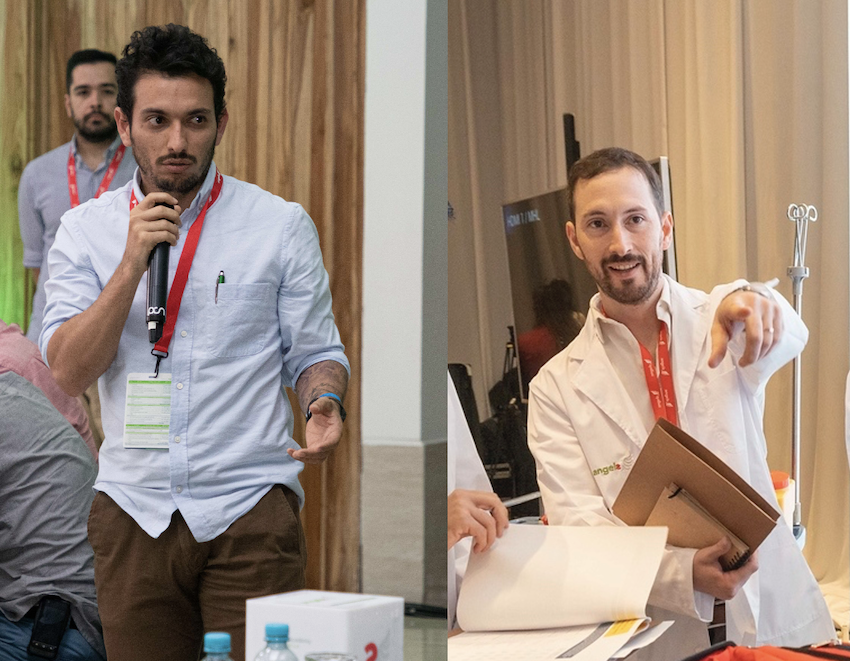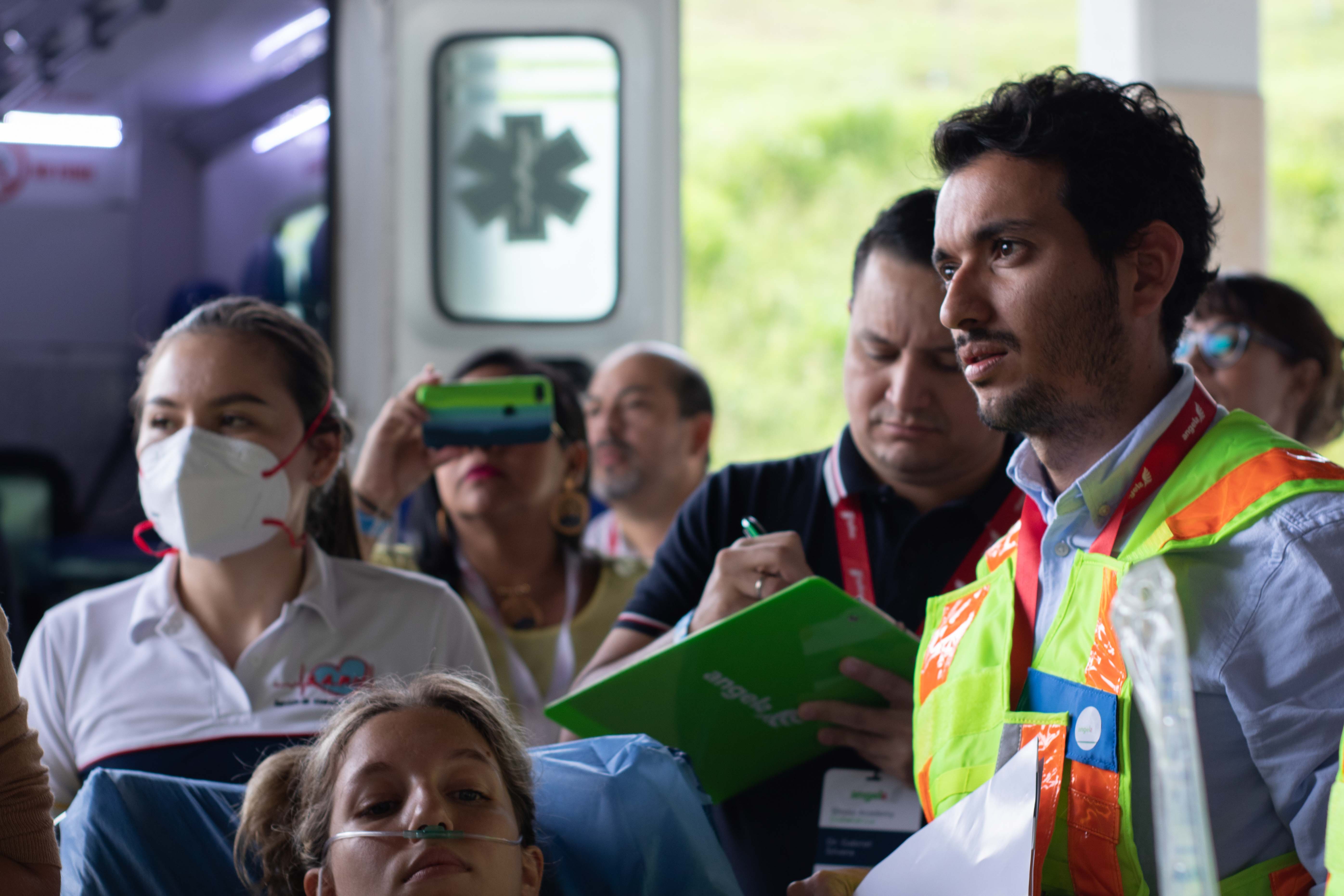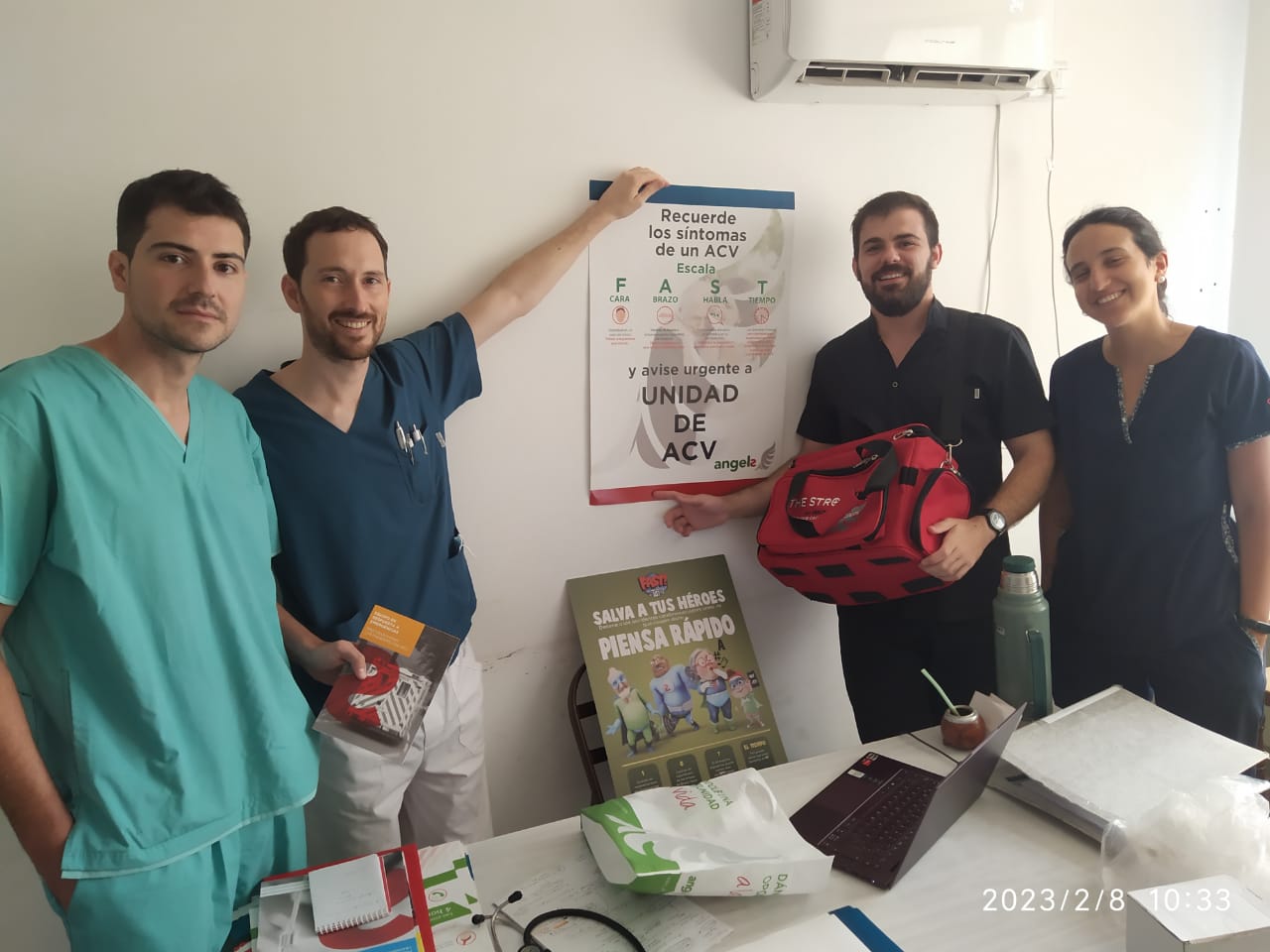
Seorang MENTOR, kata Oprah Winfrey, adalah “seseorang yang memungkinkan Anda melihat harapan di dalam diri Anda”. Harapan adalah salah satu hal pertama yang dialami Dr. Claudio Jiménez, ahli neurologi di Rumah Sakit Simón Bolívar di Bogotá, Kolombia, saat ia bertemu dengan dokter muda Argentina, Dr. Ignacio Girolimini. Tepat setelah itu, dia melihat kemiripan yang kuat dengan Lionel Messi.
“Ignacio memiliki kemauan, dan harapannya jelas,” katanya.
Kedua dokter bertemu di bawah ROPU South America Mentoring Programme yang dikelola oleh Deborah Ferreras, ketua tim Angels untuk Amerika Selatan, dan Manajer Medis Kardiovaskular Alejandro Lakowsky.
Dr Girolimini ingin meningkatkan perawatan stroke di kota kecilnya. Dr Jiménez, yang telah mengubah perawatan stroke di rumah sakitnya sendiri di Bogotá, ditunjuk sebagai mentornya. Di bagian lain dalam masalah ini, Anda dapat membaca lebih lanjut tentang kedua dokter ini. Inilah cara mentor ini berkembang, dengan kata-kata mereka sendiri.

Dr. Claudio Jiménez:
Saya percaya bahwa semua pekerjaan yang dapat kita lakukan di institusi kita dan pengalaman yang telah kita peroleh mencapai nilai sebenarnya ketika dibagikan. Jadi, mengapa menurut saya perlu terlibat dalam program mentoring untuk membantu membangun pusat dan jaringan stroke di Amerika Latin? Alasannya bukan hanya karena obat-obatan ini diperlukan, atau obat-obatan adalah kebaikan bersama bagi umat manusia, tetapi juga kewajiban untuk berbagi pengalaman sukses di luar batas sempit “kita” dan “kita”.
Ketika saya bertemu Ignacio, hal pertama yang saya pikirkan adalah, “Tapi dia terlihat seperti Messi!!” Pikiran saya berikutnya adalah bahwa hal ini sama bagi kita semua yang harus memulai dari nol dan ingin mengubah proses perawatan bagi orang-orang yang menderita stroke. Saya memiliki keraguan yang sama pada awal membangun tim kami dan akhirnya pusat stroke kami. Jadi kami memulai dialog yang dimulai dari apa yang bagi saya adalah dasar dalam jenis usaha ini:
“Ignacio, mereka akan memberi tahu Anda seribu kali bahwa rencana tersebut tidak memungkinkan. Anda harus terus meyakini bahwa Anda dapat, hingga Anda mencapainya, karena Anda akan mencapainya.”
Dan dengan ekspresi kepanikan yang bercampur dengan harapan yang sangat besar, ia berkata: “Mari kita bekerja, kita sudah memiliki tomografi!”
Saya melihat seorang manusia bersedia menginvestasikan waktunya untuk merawat apa yang dia definisikan sebagai “momen penting dari keberadaan kita”.
Dr. Sheila Martins selalu mengatakan bahwa “kemauan dan tomografi” adalah semua yang diperlukan untuk mengobati stroke. Ignacio memiliki keinginan, dan harapannya jelas. Saya sangat percaya bahwa ini adalah dua hal yang menggerakkan kita. Jika ada kemauan dan harapan, kita memiliki alat bantu yang mendasar untuk sukses. Kemudian kita belajar untuk menoleransi kegagalan dan mengatasi penolakan. Ignacio memiliki atribut dasar dan diperlukan ini.
Hal lain yang sangat penting, dan yang dilakukan Ignacio dengan kealamian mutlak, adalah bahwa pekerjaan pemimpin adalah kuncinya, tetapi triknya adalah menjadi contoh. Kata orang ketika Anda seorang pemimpin yang baik, orang-orang tidak mengikuti perintah, mereka mengikutinya. Ignacio selalu yang pertama untuk menangani kasus, selalu bersedia menjawab panggilan untuk kode stroke, dan ini meresapi seluruh kelompok – keinginan untuk melakukan hal yang sama dan bekerja tanpa lelah untuk membantu pasien.
Tantangan stroke bersifat universal. Ini selalu dimulai dengan satu atau dua orang yang ingin menerapkan protokol perawatan. Kemudian ada keterbatasan teknologi, yang untungnya dalam kasus Ignacio diselesaikan dengan menyumbangkan alat pemindai CT ke rumah sakitnya.
Pemberian obat untuk mereperfuse pasien dengan stroke iskemik akut adalah satu hal. Mengumpulkan data, mengelolanya, menganalisisnya, dan menggunakannya adalah hal lain agar tim berkembang. Bagi seorang dokter untuk melakukan pekerjaan klinis dan kemudian harus memuat data ke dalam tabel Excel pada malam hari atau akhir pekan gratis, hal tersebut merupakan hambatan. Sekali lagi, Ignacio telah melakukan pekerjaan tersebut, tetapi ketika populasi belajar cara mengenali sistem stroke dan volume pasien meningkat, hal tersebut menjadi tidak dapat dipertahankan.
Kemudian ada semua batasan sistem perawatan kesehatan di wilayah kita – baik pasien memiliki jaminan sosial maupun tiba di rumah sakit yang tidak dapat mengobati mereka dan kemudian harus dipindahkan ke pusat yang memiliki tomografi. Inilah mengapa kita meluangkan waktu untuk membicarakan jaringan stroke. Jaringan adalah satu-satunya cara untuk mengakhiri hambatan akses yang mengerikan terhadap terapi reperfusi pada stroke akut.
Program mentoring Angels lebih dari sekadar sebuah inisiatif yang indah, melainkan sebuah kebutuhan global. Sangat penting agar pengalaman dokter dibagikan di luar penelitian dalam jurnal medis, yang tentu saja merupakan kunci pengembangan ilmu pengetahuan kita. Akan tetapi, kita harus berinvestasi dalam mengalihkan pengalaman kita secara langsung kepada orang-orang dan kelompok orang-orang yang membutuhkannya, terutama di komunitas dengan akses yang sulit ke sumber daya.
Saya memiliki mentor sepanjang kehidupan profesional saya, mulai dari studi sarjana hingga pelatihan saya sebagai ahli neurologi dan neurofisiologi. Tetapi jika saya harus menyebutkan seseorang yang membantu saya mengembangkan keterampilan yang saya miliki saat ini dan menemukan alat yang saya miliki, tidak diragukan lagi Dr. Liselotte Menke Barea, seorang ahli neurologi di Porto Alegre, Brasil. Dia adalah kepala bagian pelayanan saat saya berlatih di sana dan kepribadiannya, disiplinnya, dan kelembutannya dalam menangani pasien yang benar-benar mengubah cara saya mempraktikkan kedokteran.

Dr. Ignacio Girolimini
Apa yang memotivasi Anda untuk melamar program bimbingan ini; apa yang ingin Anda capai?
Pertama-tama, kita menemukan diri kita tanpa panduan yang jelas tentang cara melanjutkan, cara menyatukan upaya, dan memberikan keteraturan pada berbagai tugas yang harus kita laksanakan. Dokter EMS, Dr. Carlos Ruffini, menyarankan agar saya mempresentasikan proyek kami untuk program mentoring.
Kami berharap memiliki panduan dan menerima bantuan dalam mengorganisasi dan mengonsolidasikan proyek pembentukan unit stroke di rumah sakit kami.
Apa yang Anda ketahui tentang Dr Jiménez sebelum asosiasi Anda dimulai?
Sebelum bekerja sama, saya tidak mengenal Dr. Jiménez atau karya mengesankannya di Bogotá.
Jelaskanlah pertemuan pertama Anda dengan Dr Jiménez dan kesan awal Anda terhadapnya.
Bertemu Claudio adalah pengalaman yang luar biasa. Dia adalah orang dengan banyak komitmen, pengetahuan, semangat, dan yang terpenting, empati bagi rekan kerjanya dalam situasi yang serupa dengan dirinya.
Kualitas apa yang Anda amati dalam dirinya yang membuatnya menjadi mentor yang sukses?
Dedikasi dan komitmennya, selalu dengan keyakinan bahwa realitas kita di Amerika Latin dapat dan harus diubah, dan bahwa kita dapat bercita-cita untuk menawarkan perawatan yang komprehensif dan berkualitas kepada pasien stroke kita.
Bagaimana bimbingannya memengaruhi terobosan dalam perawatan stroke di rumah sakit Anda?
Saya sangat bersyukur atas dukungan Dr. Jiménez dalam mendukung kami dalam pembentukan unit stroke. Ini sangat membantu dalam mengonsolidasikan diri kita sebagai tim kerja dan bukan hanya inisiatif sementara.
Bagaimana Anda melihat nilai dari program semacam ini, dan apakah Anda melihat diri Anda sebagai mentor masa depan bagi dokter yang lebih muda?
Program seperti ini sangat penting, terutama untuk mendukung kita yang jauh dari kota-kota besar atau pusat kompleksitas tinggi. Saya benar-benar siap untuk memberikan kembali semua yang telah mereka berikan kepada kita, dan saya akan senang berbagi pengalaman kita.



